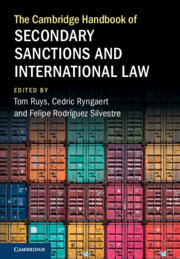Book contents
- The Cambridge Handbook of Secondary Sanctions and International Law
- The Cambridge Handbook of Secondary Sanctions and International Law
- Copyright page
- Contents
- Figures
- Contributors
- 1 Introduction
- Part I Secondary Sanctions
- 2 ‘Secondary Sanctions’
- 3 The Economic Effect of Secondary Sanctions on Firms
- 4 The Impact of Unilateral (Especially US Secondary) Sanctions
- 5 The EU and the Politics of US Secondary Sanctions
- Part II Secondary Sanctions and General Public International Law
- Part III Secondary Sanctions and International Economic Law
- Part IV Secondary Sanctions in Commercial Practices and Domestic Litigation
- Part V The Future of Secondary Sanctions
- Index
4 - The Impact of Unilateral (Especially US Secondary) Sanctions
How Do International Financial Institutions and Their Compliance Officers Cope?
from Part I - Secondary Sanctions
Published online by Cambridge University Press: 14 December 2024
- The Cambridge Handbook of Secondary Sanctions and International Law
- The Cambridge Handbook of Secondary Sanctions and International Law
- Copyright page
- Contents
- Figures
- Contributors
- 1 Introduction
- Part I Secondary Sanctions
- 2 ‘Secondary Sanctions’
- 3 The Economic Effect of Secondary Sanctions on Firms
- 4 The Impact of Unilateral (Especially US Secondary) Sanctions
- 5 The EU and the Politics of US Secondary Sanctions
- Part II Secondary Sanctions and General Public International Law
- Part III Secondary Sanctions and International Economic Law
- Part IV Secondary Sanctions in Commercial Practices and Domestic Litigation
- Part V The Future of Secondary Sanctions
- Index
Summary
In the last ten years, secondary sanctions have played an important role for European regulators as well as for compliance officers working for economic operators. Even though such European practitioners are looking for guidance and experience from their interlocutors from the other side of the Atlantic, including from the US Office of Foreign Assets Control, secondary sanctions do not act in the leading role but are one of many risk factors to be considered by economic operators. Instead, prohibitive policies of European economic operators, including financial institutions, against certain governments, such as Iran and to a lesser degree Russia, are mostly based on risks unrelated to secondary sanctions. On this premise, the chapter will briefly describe the relevant regulatory framework and will then explain how the regulations are operationally implemented in international financial institutions. In doing this, the chapter will also touch on practical challenges for sanctions compliance officers, such as extraterritoriality and the EU Blocking Regulation.
- Type
- Chapter
- Information
- Publisher: Cambridge University PressPrint publication year: 2024

